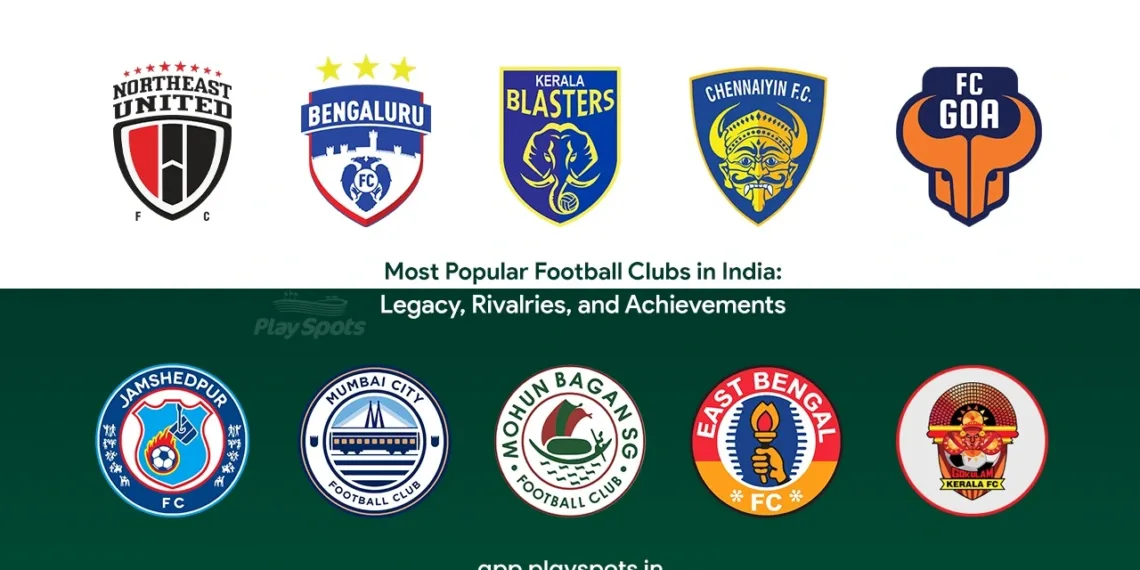Indian football is undergoing a transformative phase, and the recent announcement by the All India Football Federation (AIFF) regarding the Premier 1 Club Licensing for the 2025-26 season has brought this evolution into sharp focus.
The licensing process, a cornerstone for professionalising football clubs in India, has revealed both shining successes and surprising setbacks.
Punjab FC emerged as the only club to secure a license without any sanctions, while some of the biggest names in Indian football, including Kerala Blasters FC and NorthEast United FC, faced outright rejection. This blog post delves deep into the significance of the AIFF club licensing, the results, and what this means for the future of Indian football.
Table of Contents
Understanding AIFF Club Licensing: Why It’s a Game-Changer

Club licensing is not just a bureaucratic formality; it is a vital framework that ensures football clubs meet stringent standards across multiple domains such as infrastructure, administration, finance, legal compliance, and sporting excellence.
Globally, club licensing is recognized as a key driver for elevating the quality and professionalism of football leagues. In India, the AIFF has adopted this system to align its clubs with international best practices.
The AIFF divides licenses into two main categories: Premier 1 for clubs competing in the Indian Super League (ISL) and Premier 2 for those in the I-League.
This tiered licensing system is designed to encourage clubs to build strong foundations early, ensuring they are well-prepared to compete not only domestically but also in prestigious continental competitions like the AFC Champions League and AFC Cup.
Mr. M Satyanarayan, AIFF’s Acting Secretary General, highlighted the importance of this process by stating that while some clubs may find certain criteria challenging, these standards are essential for sustainable growth.
The licensing process pushes clubs to professionalize their operations, improve financial transparency, and invest in youth development and infrastructure — all crucial for the long-term health of Indian football.
The 2025-26 Premier 1 Licensing Results: Punjab FC Sets the Benchmark
Out of 15 clubs that applied for the Premier 1 license, Punjab FC stood out as the only club to meet every criterion without any sanctions. This is a remarkable achievement and a testament to Punjab FC’s commitment to excellence both on and off the pitch.
Their success sets a new benchmark for other clubs aspiring to reach the highest levels of Indian football. Punjab FC’s license approval without sanctions means they have demonstrated robust financial health, excellent infrastructure, proper legal frameworks, and strong sporting credentials.
This comprehensive compliance will not only boost their reputation but also enhance their ability to attract better players, sponsors, and fan support.
Clubs Granted Licenses with Sanctions: Room for Improvement
Several other prominent ISL clubs, including Mohun Bagan Super Giant, Bengaluru FC, Mumbai City FC, FC Goa, Chennaiyin FC, and East Bengal, were granted licenses but with certain sanctions. These sanctions typically relate to minor non-compliance issues such as incomplete documentation, minor infrastructure gaps, or administrative shortcomings.
While these clubs have cleared the major hurdles, the sanctions serve as a reminder that continuous improvement is necessary. The AIFF expects these clubs to address the flagged issues promptly to maintain their licenses in future seasons.
This approach ensures that clubs remain accountable and committed to raising their standards year after year.
The Shockwaves: Kerala Blasters, NorthEast United, and Others Face Rejection
The most startling news from the licensing announcement was the outright rejection of licenses for some well-known clubs. Kerala Blasters FC, NorthEast United FC, Odisha FC, Mohammedan SC, Inter Kashi, Churchill Brothers, and Hyderabad FC (owned by BC Jindal) failed to meet the licensing criteria and were denied licenses for the 2025-26 season.
This decision has sent shockwaves through the Indian football community, especially given the stature and fan base of clubs like Kerala Blasters and NorthEast United. The rejection means these clubs will face significant challenges in participating in the upcoming ISL season unless they resolve the compliance issues swiftly.
Kerala Blasters FC responded quickly with an official statement on social media, clarifying that the rejection was due to compliance requirements beyond their control.

They assured fans that they are actively engaging with AIFF and other relevant authorities to resolve the issues and regain their license as soon as possible. This transparency and proactive approach are crucial in maintaining fan trust and club credibility.
Leadership and Vision Behind the Licensing Process
The AIFF appointed Dr. Girija Mungil, a former army paratrooper turned adventure sports enthusiast, as the chairperson of the Club Licensing Committee.
Dr. Mungil’s unique background and leadership style bring a disciplined and impartial approach to the licensing process. His stewardship reflects AIFF’s commitment to fairness, transparency, and rigor in evaluating clubs.
Dr. Mungil has emphasized that the licensing process is not about penalizing clubs but about encouraging them to meet international standards that will ultimately benefit Indian football. His vision aligns with AIFF’s broader mission to elevate the sport’s quality, professionalism, and global competitiveness.
What These Licensing Results Mean for Indian Football’s Future
The AIFF’s stringent licensing process is a clear signal that Indian football is serious about professionalizing its club ecosystem. By enforcing these standards, AIFF aims to create a more competitive, financially stable, and well-managed league system that can attract better talent, sponsorship, and fan engagement.
For clubs like Punjab FC, this is a moment of pride and a stepping stone to greater success. For those facing sanctions or rejection, it is a wake-up call to improve infrastructure, governance, and compliance. The process also encourages transparency and accountability, which are crucial for the sport’s long-term growth in India.
Moreover, these licensing standards will help Indian clubs prepare for continental competitions, where professionalism and infrastructure are scrutinized closely. Meeting these criteria will enable Indian clubs to compete more effectively on the Asian stage, raising the profile of Indian football internationally.
What’s Next for Clubs and Fans?
Clubs that received licenses with sanctions must act quickly to rectify the issues identified by the AIFF. Failure to do so could result in harsher penalties or even license revocation in the future. For clubs that were rejected, the path forward involves close collaboration with AIFF to meet the licensing criteria and reapply.
Fans can expect a more competitive and professionally run ISL season in 2025-26, with clubs striving not only for glory on the pitch but also for excellence in management and compliance off it. The licensing process will likely become an annual benchmark, pushing clubs to continuously raise their standards.
Final Thoughts
The AIFF Premier 1 Club Licensing results for the 2025-26 season have stirred the Indian football landscape, highlighting both progress and challenges. Punjab FC’s clean slate is a beacon of hope, while the setbacks faced by Kerala Blasters and others underscore the work still needed to elevate Indian football.
As Indian football continues its journey towards global recognition, these licensing standards will play a crucial role in ensuring clubs are ready to compete at the highest levels, both domestically and internationally.

Fans, players, and stakeholders alike should view this as a positive step towards a more professional and exciting football future in India. Stay tuned with Khel Now for continuous updates, expert analysis, and in-depth coverage of Indian football’s evolving story.
FAQ:-
What is a Premier 1 club license?
This license allows clubs to participate in all AFC Club Competitions (subject to qualification) and the Indian Super League.
What are the criteria for AIFF Club licensing?
the minimum sporting, infrastructure, personnel and administrative, legal and financial criteria to be fulfilled by a Licence Applicant in order to be granted a Licence by the Licensor as part of the admission procedure to enter the National and AFC Club Competitions.








